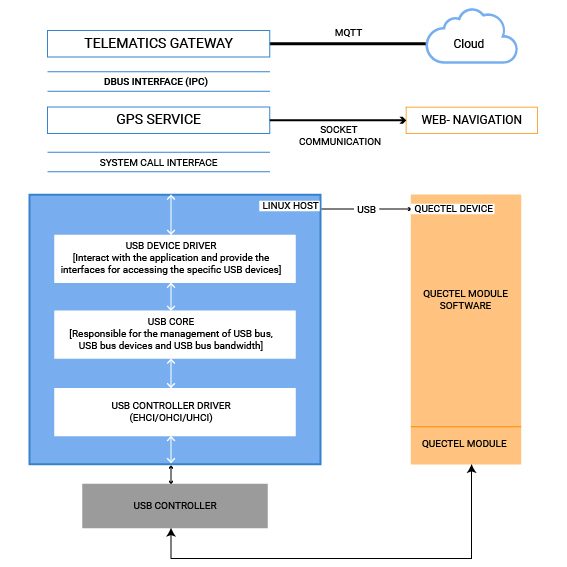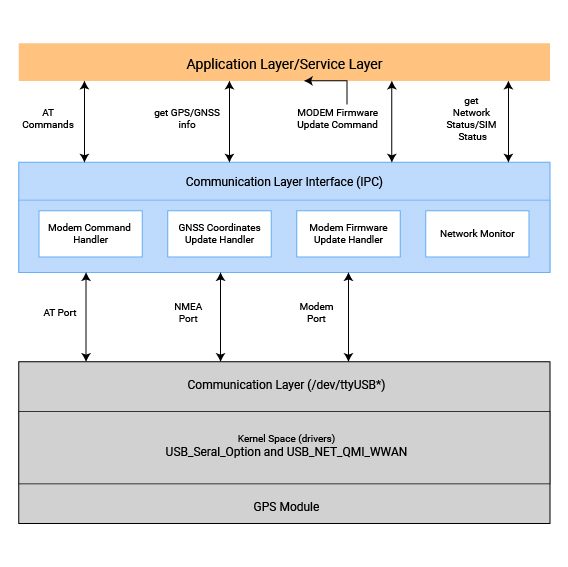Automotive OEMs are increasingly integrating ultra-modern technology in their vehicles to offer supreme comfort and personalized experiences to users. Telematics integration has hence, transitioned from “luxury” to “essential” – and is now a defining factor that helps automotive brands gain an edge over competitors.
In the development of a telematics solution, it is important to include a robust GPS service stack that determines vehicle location and positioning and passes this information to the navigation system. The design and development of such a solution may entail months of dedicated effort.
To ease the development of a telematics system and shorten development timelines, we have crafted a ready-to-deploy GPS service stack.
How Does Embitel’s GPS Service Stack Work?
Our GPS stack solution collects GNSS parameters (latitude, longitude, altitude, position time, speed, position date) from the vehicle’s in-vehicle GSM module using USB interface. Embitel has implemented GPS service which will use standard Linux system call interface to fetch GNSS parameters from respective GSM module.
The GPS service stack then parses these packets and extracts the required GNSS parameters. This information can be provided to any module in the system using any (D-Bus, Shared Memory, Pipes, Message Queues) of the IPC mechanisms.
From the navigation system, the data can be used for location tracking and for any Maps applications (Directions, Best Route, Off-Route).
The GPS stack software is modularized so that it works independent of the underlying hardware. The stack which has been implemented has been rigorously tested and can be seamlessly integrated to different customer hardwares. Hence, a small level of customization in software is all it takes to use this stack on a different hardware platform.
Schedule a quick call with our experts and experience the best of GPS Service Stack
GPS Service Stack Architecture

GPS Service Stack Block Diagram
The architecture of our GSP service stack consists of an i.MX8 Processor on one side and a Quectel SOC on the other. i.MX8 acts as the host in this architecture.
Quectel SOC is connected through a USB Controller to the i.MX8 SOC components:
- USB Controller Driver
- USB Core – Responsible for the management of USB BUS, USB BUS devices and USB BUS bandwidth.
- USB Device Driver – Enables the interaction between the driver and the application layer. Our stack can then read the GPS packets from those files.
GPS Service Low Level Design

After the GPS service stack parses the GNSS parameters the data can be sent to two applications:
- Web Navigation system through socket communication
- Use cases – Location Service, MAP services (Directions, Best Route, Off-Route)
- Telematics gateway, from where it is sent to the cloud through MQTT protocol
- Use Cases Fleet Management, Vehicle Tracking
Once the data is updated on the cloud, it can be processed by multiple business intelligence applications. One of the use cases – From anywhere in the world, one could get the status of the vehicle through authorized access with the cloud.
Key Features of GPS Service Stack

- The GPS service stack is a robust solution that is ideal for telematics, navigation and digital cockpit use cases.
- The stack can be purchased on a one-time licensing model. This includes IP rights and source code of the GPS service software. This model benefits the customer, as it lends flexibility of integrating the software stack across multiple projects or product lines. However, our business model may be re-planned according to the customer’s specific needs.
- The stack has a modular architecture so, it is easy to integrate and customize..

